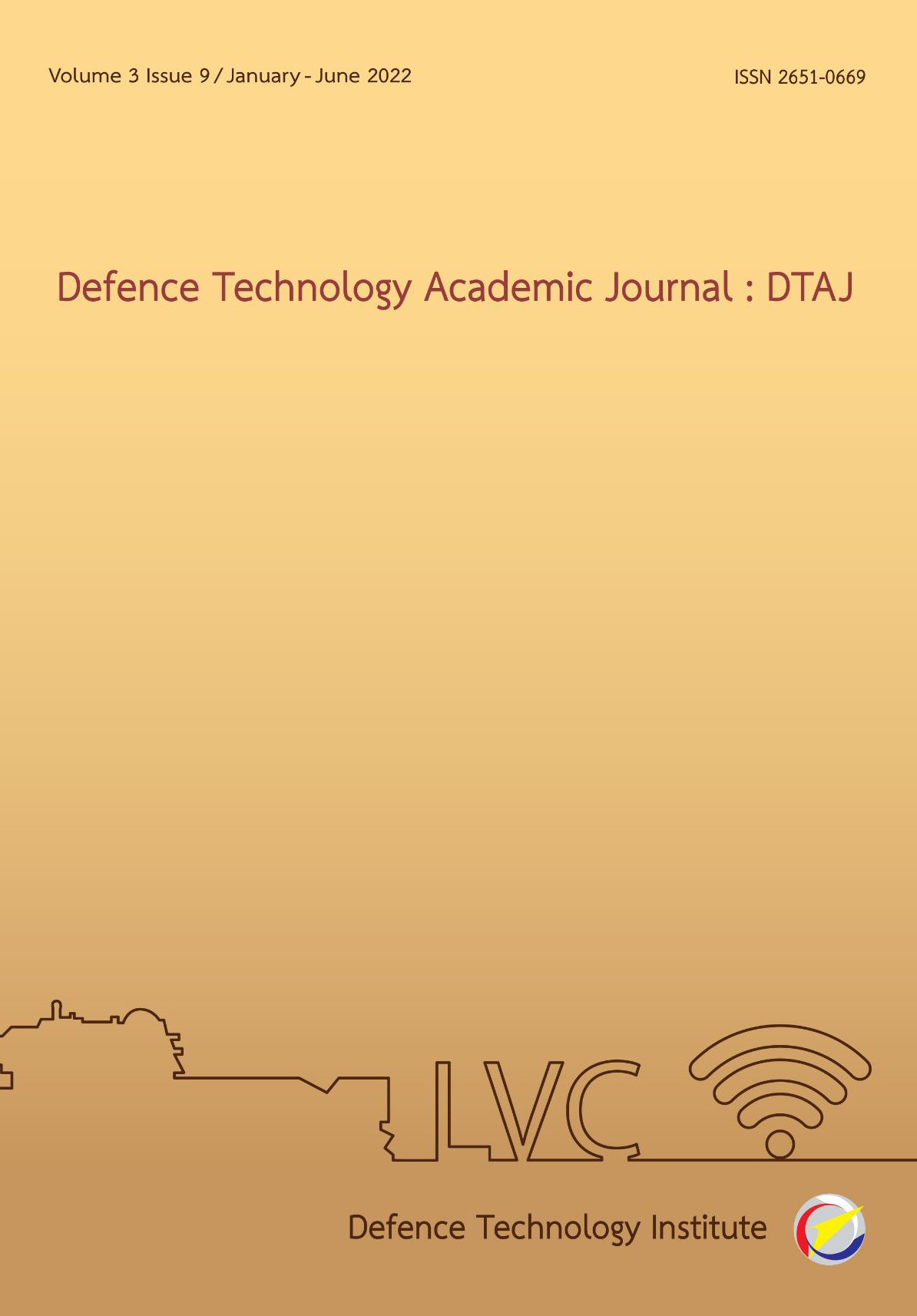Scenarios of Flooding Water Level Using Digital Elevation Model based on Unmanned Aerial Vehicle System Case Study: Tha Wanga Pha District, Nan Province
Main Article Content
Abstract
The study is focused on scenarios of flood water level using Digital Elevation Model (DEM) from Unmanned Aerial Vehicle System (UAVs), a case study of Tha Wang Pha District, Nan Province. The main objectives of research are to; 1) create DEM using UAVs; and 2) to estimate flood water level in different scenarios using DEM from UAVs. The authors conducted survey in the study area using UAVs and integration with Global Navigation Satellite Systems (GNSS), Post-Processing Kinematic (PPK). By using photogrammetry process could derive Orthophoto with 10 cm spatial resolution. The Orthophoto results showed the horizontal tolerance in a x-axis and a y-axis of 5.0725 cm, and 7.8635 cm, respectively, and a vertical tolerance in a Z-axis of 14.3460 cm. Using orthophoto, contour line was constructed to estimate flood water levels. Thailand extreme flood event in 2006 (2549 BC) was applied to simulate a flood situation. The results showed that with a flood level of 5 m, the affected areas approximately 7,710 rai. This study also examined the effect of land use type. The results showed the top three most affected areas were paddy field and village area at 54.06 and 22.27 percent, respectively.
Downloads
Article Details

This work is licensed under a Creative Commons Attribution-NonCommercial-NoDerivatives 4.0 International License.
Journal of TCI is licensed under a Creative Commons Attribution-NonCommercial-NoDerivatives 4.0 International (CC BY-NC-ND 4.0) licence, unless otherwise stated. Please read our Policies page for more information...
References
ศูนย์อำนวยการบรรเทาสาธารณภัย กรมป้องกันและบรรเทาสาธารณภัย. “ย้อนสถิติ 5 ปีไทยเสียหายจาก “น้ำท่วม” เท่าไร,” https://workpointnews.com/2019/09/09/flood-11/ (วันที่เข้าถึง 1 มิถุนายน 2565)
E. Parizi, S. Khojeh, S. M. Hosseini and Y. J. Moghadam, “Application of Unmanned Aerial Vehicle DEM in Flood Modeling and Comparison with Global DEMs: Case Study of Atrak River Basin, Iran,” Journal of Environmental Management, Vol. 317, pp. 1-14. 2022.
S. Bilasco, G. Hognogi, S. Rosca, A. Pop, V. Iuliu, I. Fodorean, A. Marian-Potra and P. Sestras, “Flash Flood Risk Assessment and Mitigation in Digital-Era Governance Using Unmanned Aerial Vehicle and GIS Spatial Analyses Case Study: Small River Basins,” Remote Sensing, Vol. 14, No. 10, 2022.
K. Trepekli, T. Balstrom, T. Friborg, B. Fog, A. N. Allotey, R. Y. Kofie, and L. Moller-Jensen, “UAV-borne, LiDAR-based elevation modelling: a method for improving local-scale urban flood risk assessment,” Natural Hazards, Vol. 113, No. 1, pp. 423-451. 2022. DOI: 10.10 07/s11069-022-05308-9.
K. Xu, J. Fang, Y. Fang, Q. Sun, C. Wu, and M. Liu, “The Importance of Digital Elevation Model Selection in Flood Simulation and a Proposed Method to Reduce DEM Errors: A Case Study in Shanghai,” International Journal of Disaster Risk Science, vol. 12, no. 6, pp. 890-902. 2021. DOI: 10.1007/s13753-021-00377-z.
M. Karamouz and F. F. Mahani, “DEM Uncertainty Based Coastal Flood Inundation Modeling Considering Water Quality Impacts,” Water Resources Management, vol. 35, no. 10, pp. 3083-3103. 2021
สำนักงานพัฒนาเทคโนโลยีอวกาศและภูมิสารสนเทศ (องค์การมหาชน). “รายงานผลการดำเนินงานด้าน Geospatial Big Data ของสำนักงานพัฒนาเทคโนโลยีอวกาศและภูมิสารสนเทศ (องค์การมหาชน) : สทอภ..” gistda.or.th. https://flood.gistda.or.th (วันที่เข้าถึง 1 มกราคม 2565)
สำนักงานพัฒนาเทคโนโลยีอวกาศและภูมิสารสนเทศ (องค์การมหาชน). “มาตรฐานข้อกำหนดข้อมูลภูมิสารสนเทศพื้นฐาน (FGDS) ชั้นข้อมูลการใช้ประโยชน์ที่ดิน.” ngis.go.th. https://ngis.go.th/wp-content/uploads/2017/10/10_FGDS_4.1.pdf (วันที่เข้าถึง 1 มกราคม 2565)
ไพศาล สันติธรรมนนท์, ภาณุ อุทัยศรี และ ธีระภัทร ชื่นชม, “สนามทดสอบการทำแผนที่ด้วยอากาศยานไร้คนขับ,” กรุงเทพฯ: คณะวิศวกรรมศาสตร์ จุฬาลงกรณ์มหาวิทยาลัย, 2554.
ASPRS. ASPRS Accuracy Standards for Large-Scale Maps, March, 1990.


